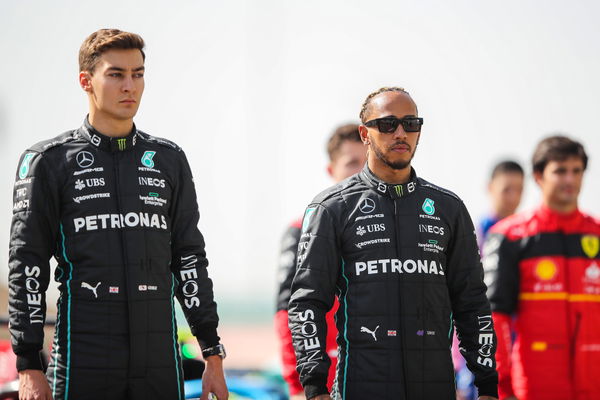
via Getty
BAHRAIN, BAHRAIN – MARCH 10: George Russell of Great Britain and Mercedes and Lewis Hamilton of Great Britain and Mercedes pose for a photo during Day One of F1 Testing at Bahrain International Circuit on March 10, 2022 in Bahrain, Bahrain. (Photo by Mark Thompson – Formula 1/Formula 1 via Getty Images)

via Getty
BAHRAIN, BAHRAIN – MARCH 10: George Russell of Great Britain and Mercedes and Lewis Hamilton of Great Britain and Mercedes pose for a photo during Day One of F1 Testing at Bahrain International Circuit on March 10, 2022 in Bahrain, Bahrain. (Photo by Mark Thompson – Formula 1/Formula 1 via Getty Images)
Formula 1 has been taking steps toward sustainability for quite some time now, and in 2019, the business committed to becoming 100% carbon-neutral by 2030. And being a business, one of its main aims is to reduce costs and maximize profits. But sustainability is also a major goal, so to achieve both, the FIA has decided to discontinue using tire warmers, likely starting in 2024. Although this move is not something many drivers are supporting including Mercedes men George Russell & Lewis Hamilton.
Cold tires on an F1 car are like mixing water and oil. It doesn’t work. The rubber used to make tires is softer and more malleable than regular tires, and when they get warm, they tend to grip the tarmac better. F1 tires go through what is called a heat cycle. They take some time to heat up, but the car’s speed improves because of maximized grip once they’re in the right temperature window. And tire warmers are crucial to getting the cycle started. So is stopping the use of tire warmers the way to go?
George Russell isn’t looking forward to a time without tire warmers
ADVERTISEMENT
Article continues below this ad
In Bahrain Testing this year, the FIA announced that it’ll ban the use of tire warmers as part of F1’s plan to become sustainable as early as 2024. But how do warmers affect the environment? They run on electricity, loads of it. And they are bulky. So they contribute immensely to a team’s logistics and fuel consumption. And contrary to popular belief, it’s not F1’s track running that has the highest carbon footprint. It’s the logistics. So why are drivers and teams apprehensive about this decision?

via Reuters
Formula One F1 – British Grand Prix – Silverstone Circuit, Silverstone, Britain – July 3, 2022, Mercedes’ Lewis Hamilton in the pits during the race Pool via REUTERS/Matt Dunham
Tire warmers help drivers achieve grip in their cars almost from the get-go. But if they’re removed, drivers will leave the pits on cold tires with no grip, and the chances of sliding and crashing into others increase by a lot. Lewis Hamilton even said this was the wrong decision when FIA announced it earlier this year, and George Russell believes the same.
In an interview with motorsport.com, as quoted by gpfans.com, he said, “So I am very concerned about all the mechanics in the pits during a pit stop, but also about the out lap during a race in cool conditions. There are going to be crashes, I have no doubt about that.” He explained that under practice conditions, sliding around due to low grip isn’t that big of an issue when there aren’t too many cars around. But the first few laps on cold tires after a pitstop would be very dangerous and tricky under racing conditions.
The FIA believes this decision will urge teams to find newer solutions for tire management and help the sport become more innovative. While that will happen, would it be considered the right move if it happens at the cost of more crashes and invariably increasing costs? Tire temperature is instrumental to a car’s performance, and Red Bull will attest to that.
Red Bull’s tire temperature nightmare in Canada
ADVERTISEMENT
Article continues below this ad
Red Bull has won every race so far this season and by some margin. Well, except for the last race in Montreal, where Max Verstappen crossed the line just 9.5 seconds ahead of second-placed Fernando Alonso. While 9.5 seconds seems like a considerable margin, it’s nothing compared to the 20+ seconds Red Bull had to other teams before Canada. And it all came down to its ability to get tires up to temperature.

via Reuters
Formula One F1 – Monaco Grand Prix – Circuit de Monaco, Monte Carlo, Monaco – May 28, 2023 Red Bull’s Max Verstappen in action during the race REUTERS/Piroschka Van De Wouw
The RB19 is suited to keeping tire temperatures under control, but in the cool conditions in Montreal, the car struggled to warm its tires, especially the hard compound. Because of the cool tires, Verstappen couldn’t find the grip he needed to pull away from the pack like usual. Imagine the same situation but without tire warmers. Verstappen had the advantage of tire warmers in this situation which gave him at least some grip to start with. Had the tires been cold from the start, who knows how much closer Alonso would’ve finished to Verstappen?
ADVERTISEMENT
Article continues below this ad
While F1 is all about becoming sustainable, it is also about safety. And tire warmers make it safer. Without them, there could be a chance F1 would become Destruction Derby. Do you think the FIA is making the right move banning tire warmers? The teams and drivers are set to vote on this at the British GP.
WATCH THIS STORY | Spotted: F1 Stars Max Verstappen & George Russell Enjoy Miami Heat’s Dominant Surge at NBA Playoffs

